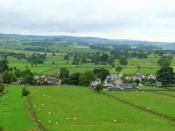During the 18th century Britain was growing. As a result of this hasty expansion the existing systems and techniques used in agriculture were no longer sufficient to feed a rapidly increasing population. This meant that change to the extremely wasteful older system was needed in order to fuel the growing needs of the country, and to feed the ever growing population.
There were many causes of this ÃÂagricultural revolutionÃÂ Britain was at war with France ÃÂ consequently the soldiers needed to be fed, and due to war, supplies imported from Europe (e.g. corn) were reduced. This added significant strain on the food being produced in England which added stress to the farmers. In the early 18th century, much of the countryside was farmed as an open field system. This system was more in favour of farming for personal requirements rather than for the nationÃÂs commercial needs. This open field farming was incredibly wasteful and also encouraged the spread of weeds and plant diseases.
The disadvantages of the old system were now being emphasized by the growing need for food. Therefore changes were needed.
Perhaps the most important and significant development of were the enclosures. Enclosure simply meant doing away with the 'Open Field' system, replacing it with large fields, enclosed by fences or hedgerows and drained by the landowners. The system of Enclosure had the simple advantage over the 'Open Field' system, in that it produced far more food, and meant that no land was wasted. There were two methods of gaining Enclosure, either via consent of all the landholders in a village ÃÂ or by Parliamentary Enclosure.
With Enclosure, farming quickly became a cost-effective business and had many benefits: The banks were keen to lend to farmers who wanted to improve their land because they could see it as...


